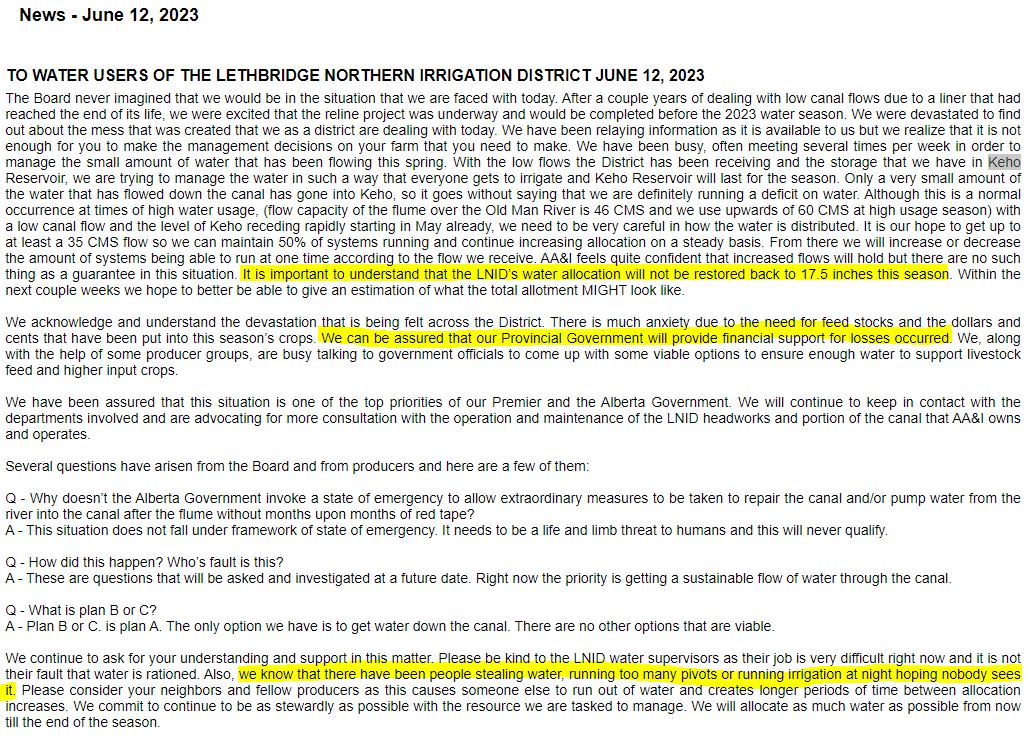Cale Hubka started out the 2023 growing season optimistic, deciding to try his hand at potatoes for the first time — a specialty crop that takes 22 inches of water to grow.

“There was a good snow pack and lots of water available so having water restrictions didn’t seem like it was going to be on the table,” said Hubka, owner of Hubka Farms Ltd. near Carmangay, Alta.
Before the 2023 water season, the Main Headworks Canal, located in the Lethbridge Northern Irrigation District (LNID), was shut off so Alberta Agriculture and Irrigation could repair a liner that had been leaking for a few years.
The district said when it was turned on in late-April, construction-related leaks were discovered extending the shutdown indefinitely, leaving farmers with just a fraction of their normal irrigation.
They are now being told that the Keho Reservoir is also running low.
“Each landowner (owned, rented or leased land) will be permitted to irrigate effective Monday, June 12, 2023, on no more than 50% at the same time of the irrigation acres being farmed provided AA&I has increased the canal flow to 30 cms,” said a post on the LNID website.
“Right now I’m restricted to three and a half inches of water where we usually have 17, and I’ve already used two of those just to maintain the crop,” said Dave Bishop, director at large for Alberta Wheat.

Get breaking National news
If this continues, combined with the lack of rain, he’s expecting to see less than half his normal yield.
“If we get an inch of rain, I’ll be good for another two weeks; if we don’t, then I’ll be out of water in two weeks,” said Bishop.
“There’s a lot of money on the line, and I mean a lot of cattle producers in this district as well that need to know if they’re going to have enough feed for the feed lots in the winter,” said Hubka.

The Ministry of Agriculture and Irrigation issued the following statement to Global News:
“Alberta’s government is fully invested in ensuring water gets to the people who need it. We recognize the Oldman River’s importance to the Piikani Nation, municipalities and farmers that rely on water from the Lethbridge Northern Irrigation District. In addition, we understand the impacts the delay in repairs and flow reduction has had on agricultural operations.
“The contractor is working very hard to complete the required repairs as soon as possible and we are taking the necessary steps to avoid water interruptions for this and future growing seasons.”
A Monday post on the LNID website, meanwhile, said:
“LNID’s water allocation will not be restored back to 17.5 inches this season,” but assured the “provincial government will provide financial support for losses occurred.”
The LNID is also aware of “people stealing water, running too many pivots or running irrigation at night hoping nobody sees it.” They are telling their users to “please consider your neighbors and fellow producers as this causes someone else to run out of water and creates longer periods of time between allocation increases.”
Hubka says he’s holding out hope some of his specialty crops will survive, but added, “We need answers now on what to do. We need a plan.”



Comments
Want to discuss? Please read our Commenting Policy first.